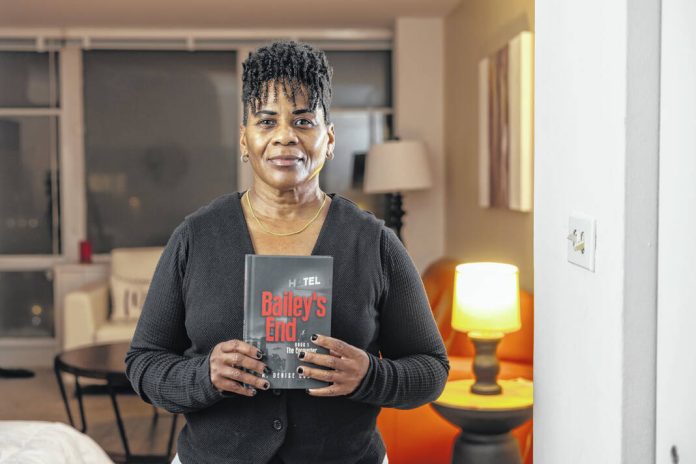CHICAGO — With a healthy dose of paranoia, fear of darkness, Felicia Bailey comes to life in the 145 pages of M. Denise Conner’s book, “Bailey’s End: Book 1 The Encounter.” Conner lets the audience glimpse the inner workings of the introverted, yet successful Felicia as she traverses the Chicago landscape trying to cope with her anxiety and bolster her mental wellness.
Felicia is a 40-year-old architect with no plans to marry or have a family, living her life the best way she knows how in Chicago. As she lives that life, we get a first-hand view of the mental anguish she endures day to day.
Felicia wants to appear as if she has a full life to the neighbors in her apartment building, so she puts on heels and stomps loudly around her abode and then slams her front door to make it seem as if she has a life like others — with people who we care about and care about us. Felicia seems somewhat aloof and in her own mind most of the time, when she’s not working on blueprints and drawings for her job. She has liaisons with men in her mind, but has been celibate for three years to remain connected with herself without a need to validate who she is to anyone else.
Felicia (aka Fifi) eventually seeks the help of psychiatrist Dr. Benjamin Long, a psychiatrist referred by a workplace colleague. As we go further into Felicia’s life and her mental health, we get glimpses of traumas caused by her family and her environment. As Felicia faces her fears and fantasies, the book turns more into a mystery/thriller, where the ante keeps being raised. Stalking, violence and murder occur before the book ends. But who is the killer? Her psychiatrist? Who is the stalker? Her coworker? And does the heroine make it out unscathed?
“Growing up in a household where her mother was emotionally battling depression, Felicia experienced all that and it affected her,” Conner said about her main character, named after a childhood friend. “Her struggle with self-love and self-worth … Is she worthy of love at all? Now she’s a professional on the rise, financially sound. But in her mind, what’s going to come along rattles all that happiness, because she’s still attuned to hard times.”
A fan of suspense, Alfred Hitchcock, “The Twilight Zone” and science fiction, Conner said she purposefully wrote the book with the goal of building the anticipation so it never levels off.
“All too often, stories start and end on a happy note,” the Bronzeville resident said. “That’s not how life is. We’re going to have our ups and downs, it’s never an even playing field.”
Equipped with a background in psychology, Conner penned the first book in her thriller trilogy and dedicated it to her late mother Bessie, who battled depression. She’s working on releasing the second book, “Survivor’s Remorse,” this summer.
Conner said “Survivor’s Remorse” will feature a Felicia Bailey who has gotten over the nightmares, but now has a different issue and problem. Much like the first book, she plans to add a lot of raw emotion to it.
Conner finds “Bailey’s End” relatable, saying many people deal with mental health issues or know of those who do. Having lost her mother at the age of 13, Conner said taking psychology courses in college gave her some clarity and understanding of the grief process. She began writing as an outlet. While the book has whodunit tones, Conner said the overall theme is mental health and self-love.
“Self-love helps us keep things balanced,” she said. “That’s a very vital thing in the book that I hope people get — the need for self-love. Even though Felicia was lonely, no kids, no husband, she did have a happy place where she gave herself that self-love that she craved when she was younger and wasn’t able to get.”
“We all struggle with something,” she said. “You’re not always going to be happy. We’re going to experience those periods where we just feel like ‘woe is me’ and we wish we were in a different place or position. It’s part of life, the emotions, the ups and downs; nothing is perfect, but at the same time, you have to be grateful for the place and position that we’re in and just play the hand that we’re dealt.”







